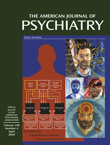Quetiapine and Pregnancy
To the Editor: In comparison with the literature on classical antipsychotics, less is known about the risks associated with prenatal exposure to atypical antipsychotics (1).While experiences with clozapine (2) and olanzapine (3) and pregnancy are found in the literature, to our knowledge, data concerning the use of quetiapine during human pregnancy has not yet been reported. We report on a patient who was treated with quetiapine during her entire pregnancy without complications.
Ms. A, a 38-year-old woman, had been treated for a diagnosis of schizophrenia (paranoid type) since 1998. After a period of outpatient treatment with zuclopenthixol, which resulted in insufficient response, her medication had been changed to quetiapine, 300 mg/day. She was not taking any other medications. After the change in medication, her symptom profile showed considerable improvement. Ms. A’s pregnancy was discovered at week 17, when she reported amenorrhea. A consultation with a gynecologist resulted in a diagnosis of an intact pregnancy, with no complications at that stage. She had been taking quetiapine when her child was conceived.
At the 20th week of pregnancy, Ms. A’s dose of quetiapine was reduced to 200 mg b.i.d.; from week 22, she was taking only 150 mg b.i.d. because her symptoms had improved significantly. She had no side effects from quetiapine during treatment. Ms. A was in remission during her pregnancy, and at week 38, she gave birth to a healthy boy. The newborn’s weight was 3120 g, his height was 48 cm, his Apgar score in the first minute was 9, and at 5 minutes it was 10. Because Ms. A continued taking her medication, breast-feeding was not introduced. Five days after delivery, Ms. A and her newborn were discharged from the hospital. Since that time both Ms. A and her son have been without any neuropsychiatric or perinatal complications. The son’s development was intact during the first 6 months of his life.
An instance of human pregnancy with quetiapine use is interesting, since the only data we discovered on the use of quetiapine during pregnancy are from an animal experiment in which the effects of maternal deprivation on prepulse inhibition could be reversed with the use of this novel atypical antipsychotic (4). It is important to note that our patient took quetiapine during her entire pregnancy. The lack of perinatal extrapyramidal side effects and the growing number of experiences of safe use of atypical antipsychotics during pregnancy can encourage clinicians to promote such treatments. However, nothing is known about the potential for long-term behavioral abnormalities in children exposed to antipsychotic drugs, especially atypical antipsychotics, in utero. A cautious clinical approach is needed, with consideration of every risk and benefit.
1. Trixler M, Tényi T: Antipsychotic use in pregnancy: what are the best treatment options? Drug Saf 1997; 16:403-410Crossref, Medline, Google Scholar
2. Dev V, Krupp P: The side effects and safety of clozapine. Rev Contemporary Pharmacotherapy 1995; 6:197-208Google Scholar
3. Goldstein DJ, Corbin LA, Fung MC: Olanzapine-exposed pregnancies and lactation: early experience. J Clin Psychopharmacol 2000; 20:399-403Crossref, Medline, Google Scholar
4. Ellenbroek BA, van den Kroonenberg PT, Cools AR: The effects of an early stressful life event on sensorimotor gating in adult rats. Schizophr Res 1998; 30:251-260Crossref, Medline, Google Scholar



